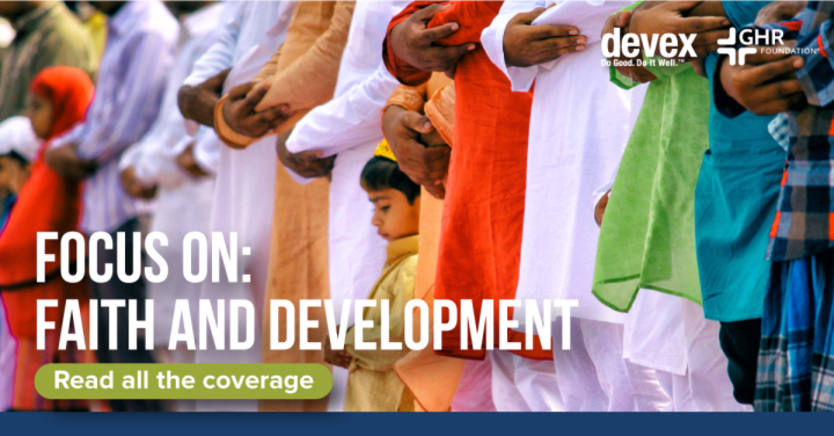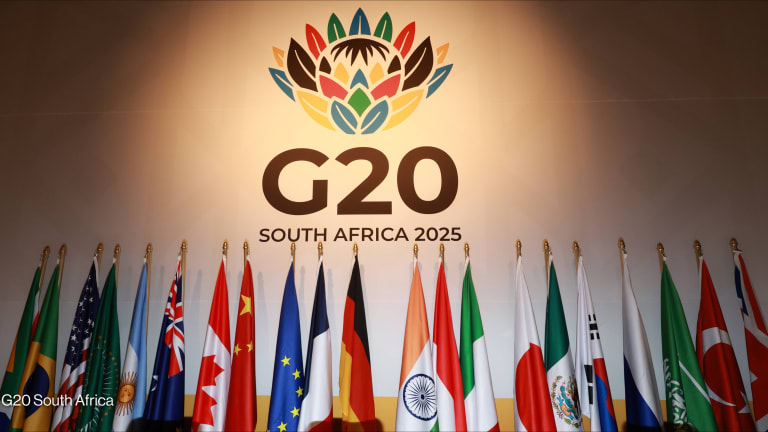
WASHINGTON — An international group of faith leaders and advocates this week delivered a series of recommendations to Saudi Arabia, which has the presidency of the G-20, ahead of the group’s high-level summit with world leaders beginning Nov. 20.
The G20 Interfaith Forum brings together faith leaders and religiously linked institutions from around the world to provide recommendations to heads of state on a host of development topics. Initially formed to address global economic issues, the G-20 has been pressed to address broader international challenges such as climate change and gender equality.
“In addition to the financial side of the G-20 process, there’s been increasing focus on global policy issues that the G-20 countries should be facing and can take initiative on,” said professor W. Cole Durham, Jr., president of the G20 Interfaith Forum Association.
Focus on: Faith and Development
This series illuminates the role faith actors and their communities play in strengthening global development outcomes.
“Each successive host country picks priorities, but our experience has been that they pick priorities that line up with the [Sustainable Development Goals] in various ways. Something like easily half of the SDGs are clearly not attainable without close collaboration with religious communities.”
The G20 Interfaith Forum began in 2014, but is not currently one of eight formal engagement groups on the sidelines of the G-20, which include other constituencies such as a “W20” for women and a “C20” for civil society.
In its 2020 recommendation document, the interfaith group made the case for formal recognition of the “I20” as an official engagement group that would gather religious leaders each year and help influence policy recommendations of G-20 member countries.
Italy takes on the presidency of the G-20 in 2021, and the interfaith forum organizers said they are already in dialogue with the Italian government to advocate for their participation. Katherine Marshall, executive director of the World Faiths Development Dialogue at the Berkley Center for Religion, Peace, and World Affairs at Georgetown University, said the Vatican is also expected to be involved in next year’s events.
“When G-20 meets and they meet about economics and the economic health of the world, [we hope] that they don’t forget the moral health, the spiritual health, the physical health that all input into that.”
— Christina Tobias-Nahi, director of communications and public affairs, Islamic Relief USAThe country at the helm of the rotating G-20 presidency is responsible for setting the group’s agenda throughout the year, and Durham said he was “pleasantly surprised” by Saudi Arabia’s engagement with the G-20 Interfaith Forum.
“I’m acutely aware of some of the religious liberty kind of problems in Saudi Arabia,” Durham said. “There are a number of NGOs and others who boycotted Saudi Arabia because of some of those kinds of issues. We felt as an organization we couldn’t, if we were going to be a G-20 organization, we couldn’t just skip a year.”
To develop its recommendations, the G20 Interfaith Forum held a series of six regional consultations with faith leaders and related stakeholders throughout the year that culminated with a global forum hosted by Saudi Arabia. The events, which took place virtually due to the pandemic, allowed a diversity of faith actors to express challenges they face and offer recommendations for the G-20 to promote peace, education, and women’s empowerment. Over 2,000 people from 90 countries participated in the forum, also held virtually, in October.
Christina Tobias-Nahi, director of communications and public affairs at Islamic Relief USA, participated in the North America regional consultation. She supports a continued hybrid G20 Interfaith Forum model, so leaders from around the world will be able to participate in discussions even if they cannot travel to the G-20 host nation.
Much of the conversation this year was dominated by the impacts of the COVID-19 pandemic and the role faith-based groups could play in response and recovery, Tobias-Nahi said.
“The number of people who are people of faith around the globe is 60+%, so the majority of the world’s population are people of faith … People are dealing with a lot right now around the globe in terms of health and losing jobs and kids out of school, unable to visit family. But what’s getting a lot of people through this is their resilience, and for many that resilience is their faith,” Tobias-Nahi said.
“When G-20 meets and they meet about economics and the economic health of the world, [we hope] that they don’t forget the moral health, the spiritual health, the physical health that all input into that.”
One of the forum’s key recommendations is that faith-based groups be intimately involved in the rollout of a COVID-19 vaccine. Tobias-Nahi said religious actors must ensure they play a positive role in vaccine distribution that will allow the world to move beyond the pandemic.
“There are many faith communities that will be reticent about the vaccination when it comes out for different religious reasons,” she said. “If everyone needs to come together as humanity to tackle this mass health problem together, we’re going to have to figure out a way to work together across faith communities and within faith communities to do this messaging.”
In addition to recommendations to address the COVID-19 pandemic, the G20 Interfaith Forum also provided proposals for advancing peace and resolving conflict; taking action to protect the planet; promoting collaboration between the public sector and people of faith; opposing corruption; empowering women; reducing structural inequality and racism; and promoting education.
In a world with dozens of multilateral institutions and forums, Marshall said the G-20 remains a key place for faith-based organizations and religious actors to present their agenda to influence policymakers.
“Why the G-20? First of all, we’ve got a big crisis: The Security Council is very stymied by all the political things, we know. The G-20 is hopefully more agile, more able to bring the leadership together for action. It has become a whole lot less informal than it was in the beginning … but it still is far more agile and more flexible than the United Nations system, where almost every word you utter within a [United Nations] context has to be massaged,” Marshall said.
“The effort of the G20 Interfaith [Forum] is not to create new ideas — but hopefully we come up with some new dimensions and new ideas — but above all to bring the best of the work that’s being done.”
Devex, with support from our partner GHR Foundation, is exploring the intersection between faith and development. Visit the Focus on: Faith and Development page for more. Disclaimer: The views in this article do not necessarily represent the views of GHR Foundation.









